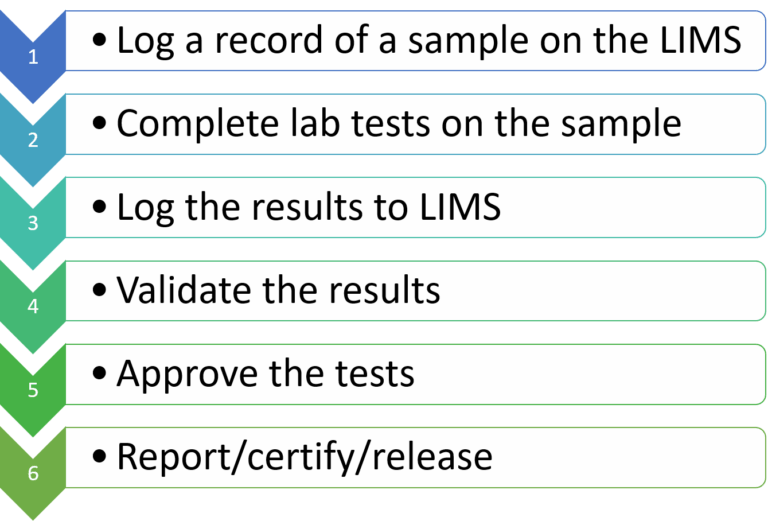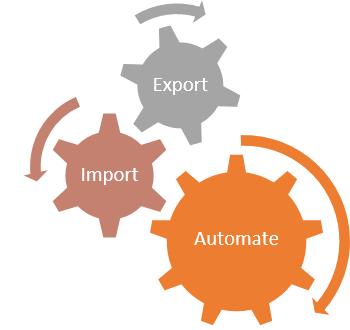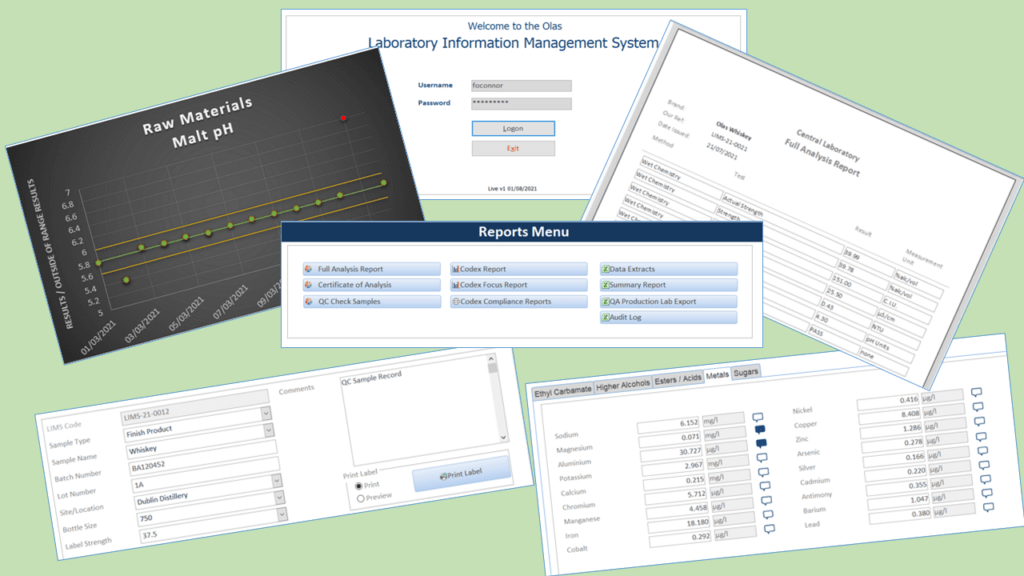It is no secret that Ireland has a great wealth of excellent Breweries and Distilleries! Yet still the brewing industry in Ireland is very much a growth industry with micro & craft brewers, gin & whiskey distilleries in particular riding the wave of opportunity.
In this carefully monitored dynamic market, brewers need to be flexible to the regulatory requirements imposed on them. A Laboratory Information Management System (LIMS) in such an environment should be able to be flexible and dynamic too.
A LIMS solution should be fully adaptable to future changes in products, testing and reporting requirements. Off the shelf lab software often does not cut it here, instead here at Olas we specialise in providing custom LIMS IT solutions developed to the client’s exact needs. Software that can be easily rolled out, updated and maintained going forward. Solutions that drive lab efficiencies, quality and compliance!

LABORATORY INFORMATION MANAGEMENT SYSTEM (LIMS)
These days’ laboratory testing forms an essential part of the brewing process; whether it is to drive for in-house quality, to ensure local/international drink standards, or to meet fair trade and regulatory compliance standards. With tests completed on everything from the raw material received, samples taken at various stages of the brewing process, finished batches, sensory tests and on returns/complaints.
Olas LIMS solutions have been used both as the central LIMS tool used within labs, or in some cases to bring additional functionality/reports to compliment more rigid LIMS systems which are already in operation in the laboratories.
Our approach is not a one size fits all; the LIMS software we design and deliver for our clients is very much custom built to the clients exact needs utilising our own experience in delivering such solutions.

COMMON FEATURES
- Digital recording, analysing and reporting features.
- Single shared real-time database resource.
- Automated data collection possibilities.
- Full historic tractability.
- Automated validation.
- Approval processes.
- Flags on tests outside limits.
- Flexibility in the system to allow for future growth and changes to requirements.
LAB BENEFITS
- Improve lab efficiencies.
- Adherence to strict standards.
- Drive quality checks and ensure regulatory compliance.
- Reduce user errors or loss of information.
- Seamless passing of tasks between team members.
- Free up time to process larger volumes of tests.
- Improve response times to ad-hoc requests for information.
- Move towards a paperless lab.
LIMS LAB CYCLE
Outlined here are some of the typical process steps in a full LIMS step-up:

- Take a Laboratory sample.
- Register it on the LIMS system. Producing a unique LIMS reference ID.
- Print the LIMS reference ID/barcode to a label which would be stuck to the sample.
- Numerous lab tests are then completed on the sample using various instruments.
- These tests would be logged on the LIMS system. Either entered manually or ideally automatically through system integration or export/import processes.
- The LIMS system would then provide automated validation checks to ensure everything falls within permitted limits.
- Lab Supervisors would then review and provide final sign off of the results.
- Reports and certificates of conformity can then be produced on the tests completed.
- Information relating to approved batches can be shared with external lab teams to allow for progression to the next production stages.
AUTOMATE DATA COLLECTION
Some of the biggest wins for the laboratory staff comes from where test results extracted by lab instruments can be automatically imported into the LIMS system. Such integration between instruments and LIMS software can massively speed up the productivity of the lab, reduce the chance for user input error, allow the lab technicians to focus on running the tests and analysing results rather completing more administrative tasks. This automation can even lead to a paperless lab environment, whereby there is no longer a need for the lab technician to temporarily record results to notepaper before inputting them into a digital medium.

These days’ most larger lab equipment/instruments can produce digital extracts of results. These results may be in the form of Excel, CSV, XML, TXT, HTML or DOC files. Where a set structure exists in the exports, Olas can look to design a custom import process to read the data and to extract the contents required for entry into the LIMS system.
For one of our larger clients, on their LIMS system we collect data for 14 separate methods, with over 120 separate tests completed across them. 90% of these tests are now collected automatically via separate custom import processes. The number of import process has steadily grown over time as new lab equipment which created usable digital extracts have come online. For this client, this move away from manual transfer of paper notes into the LIMS, towards a much more automated solution has completely transformed how the lab operates and dramatically increased the volume of tests that can be completed in any given day.
TYPES OF REPORTING
Reporting features pulling from the full history of detailed data stored in the LIMS database, can produce numerous different types of reports for different audiences. This might be to create a nicely laid out certificate of conformity to accompany a single test, or to provide detailed logs of all results, or focus charts/graphs that are to be printed/displayed on screens or noticeboards within the brewery.
The following is a sample of types of reporting that could be implemented:
- Codex Charts \ Focus Codex Charts
- Codex Compliance Reports
- Out of Specs Reports
- Full Analysis Reports
- Certificate of Analysis
- Summary Reports
- QC Checks
- QA Lab Export
- Quality Assurance
- Data Extracts
- Audit Logs

WOULD YOU LIKE TO ENQUIRE ABOUT HOW OLAS CAN ASSIST YOU IN DEVELOPING A LIMS SOLUTION?
All our tools are built to our customer’s bespoke needs, leveraging our own experience in producing such solutions. Timings and costs would be dependent on the exact customer requirements and technologies being developed too.
To learn how our development can help design and develop a IT solution tailored to your exact needs, just send an email to development@olas.ie and we will be back in touch promptly to arrange a call.
To find out more about our Application Development teams services, click HERE
Author: Fergal O’Connor, Senior Training Consultant, Application Development Department.
CALL US FOR A FREE CONSULTATION WITH SOMEONE WHO SPEAKS YOUR LANGUAGE

